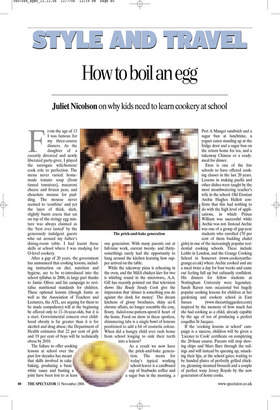How to boil an egg
Juliet Nicolson on why kids need to learn cookery at school From the age of 13 I was famous for my three-course dinners. As the daughter of a recently divorced and newly liberated party-giver, I played the surrogate wife/hostess/ cook role to perfection. The menu never varied: homemade tomato soup (from tinned tomatoes), macaroni cheese and frozen peas, and chocolate mousse for pudding. The mousse never seemed to ‘combine’ and yet the layer of thick, dark, slightly burnt cocoa that sat on top of the stringy egg mixture was always claimed as the ‘best ever tasted’ by the generously indulgent guests who sat around my father’s dining-room table. I had learnt these skills at school where I was studying for O-level cookery.
After a gap of 20 years, the government has announced that cooking lessons, including instruction on diet, nutrition and hygiene, are to be re-introduced into the school syllabus in 2008, in large part thanks to Jamie Oliver and his campaign to revitalise nutritional standards for children. These optional lessons (though Jamie as well as the Association of Teachers and Lecturers, the ATL, are arguing for them to be made compulsory) will at the beginning be offered only to 11–16-year-olds, but it is a start. Governmental concern over childhood obesity is far greater than it is for alcohol and drug abuse; the Department of Health estimates that 22 per cent of girls and 19 per cent of boys will be technically obese by 2010.
The failure to offer cooking lessons at school over the past few decades has meant that skills involved in cake baking, producing a basic white sauce and basting a joint have been lost to at least one generation. With many parents out at full-time work, current twentyand thirtysomethings rarely had the opportunity to hang around the kitchen learning how supper arrived on the table.
While the takeaway pizza is reheating in the oven, and the M&S chicken kiev for two is whirling round in the microwave, A.A. Gill has recently pointed out that television shows like Ready Steady Cook give the impression that ‘dinner is something you do against the clock for money’. The dream kitchens of glossy brochures, shiny sci-fi chrome affairs, no longer resemble the cosy, floury, faded-rose-pattern-apron’d heart of the home. Food on show in these spotless, shimmering labs is a single bowl of lemons positioned to add a bit of cosmetic colour. When did a hungry child ever rush home from school longing to sink their teeth into a lemon?
As a result we now have the prick-and-bake generation. The menu for today’s typical working school-leaver is a cardboard cup of Starbucks coffee and a sugar bun in the morning, a Pret A Manger sandwich and a sugar bun at lunchtime, a yogurt eaten standing up at the fridge door and a sugar bun on the return home for tea, and a takeaway Chinese or a readymeal for dinner.
DAVID MONTGOMERY
Eton is one of the few schools to have offered cooking classes in the last 20 years. Lessons in making paella and other dishes were taught by the most mouthwatering teacher’s wife in the school. Old Etonian Archie Hughes Hallett confirms that this had nothing to do with the high level of applications, in which Prince William was successful while Archie was not. Instead Archie was one of a group of gap-year students who enrolled (70 per cent of them budding chalet girls) in one of the increasingly popular residential cooking schools. These include Leiths in London, and the Grange Cooking School in Somerset (www.cookeryatthegrange.co.uk) where Archie cooked and ate a meal twice a day for four weeks and came out feeling full up but culinarily confident. His dinners for fellow students at Nottingham University were legendary. Sarah Raven runs occasional but hugely popular cooking lessons for children at her gardening and cookery school in East Sussex (www.thecuttinggarden.com) inspired by the memory of how much fun she had cooking as a child, already capable by the age of ten of producing a perfect coquilles St Jacques.
If the ‘cooking lessons at school’ campaign is a success, children will be given a ‘Licence to Cook’ certificate on completing the 20-hour course. Parents will stop shoving chips and Mars Bars through the railings and will instead be queuing up, smacking their lips, at the school gates, waiting to be handed plates of perfectly grilled chicken, gleaming steamed broccoli and a couple of perfect waxy Jersey Royals by the new generation of home cooks.


































































































 Previous page
Previous page